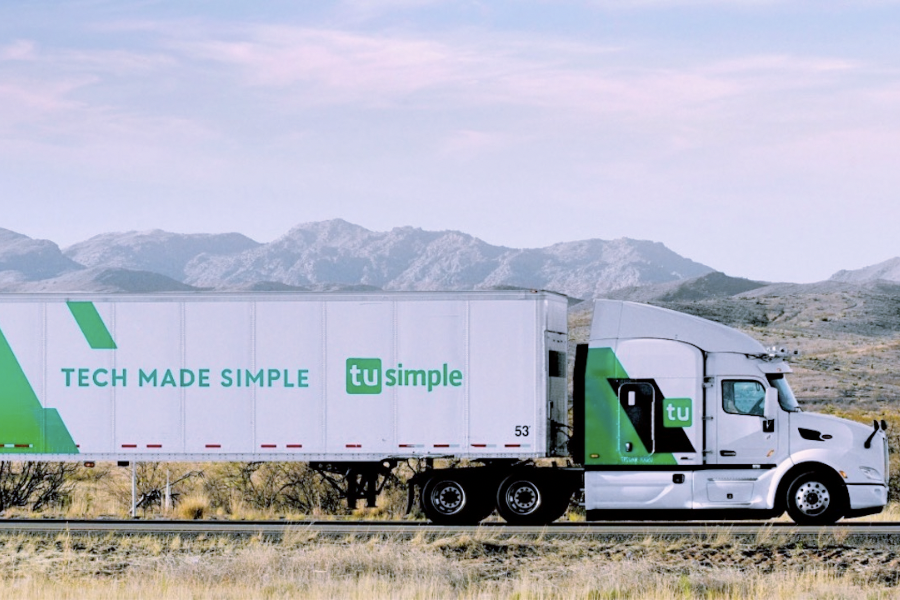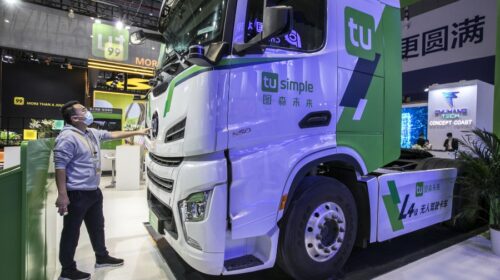TuSimple Moves Closer to China Exit Ramp as Questions Loom on U.S. Commercialization

The autonomous trucking company has reportedly received a non-binding deal to sell its Asia operations to Geely, China’s largest private carmaker
Key Takeaways:
- China’s largest private auto group may acquire TuSimple’s Asia-Pacific business, allowing it to cut its China ties and alleviate U.S. national security concerns
- The company’s commercialization timeline has been thrown into doubt following an April accident that raised safety concerns
By Trevor Mo
Autonomous trucking startup TuSimple Holdings Inc. (TSP.US) may have finally found a suitor for its China-based unit, five months after reports emerged that it was looking to sell the business. That suitor is Geely, China’s leading automaker whose past acquisitions include its 2010 landmark purchase of Swedish automaker Volvo, according to recent local media reports.
Such a deal would help TuSimple, which has major operations in the U.S. and China, drive out of a tight spot with Washington, which has expressed national security concerns due to the company’s potential future possession of sensitive data on U.S. trucking patterns. To address that issue, TuSimple signed an agreement earlier this year giving the U.S. national security regulator oversight of the technology behind its U.S.-based autonomous trucking operations.
Equally important, a Geely purchase could provide a timely cash infusion for the loss-making TuSimple, which is rapidly burning through money to fund its accelerated push to commercialize its autonomous vehicle technology ahead of a field of rival developers.
News of the potential Geely sale first came from local media AI4Auto on Aug. 20, and was quickly followed by other major tech news sites, including 36Kr and Huxiu.com. Geely has made a non-binding offer to TuSimple’s U.S. headquarters to acquire TuSimple’s Asia-Pacific business, including related subsidiaries, according to the reports.
We’ll take a closer look shortly at TuSimple’s efforts to commercialize its technology and some recent hurdles it has encountered in that process. But first we’ll review the company’s development history and how it became one of a growing number of names caught in the middle of growing geopolitical tensions between China and the U.S.
TuSimple was founded in 2015 at a time when China and U.S. still enjoyed relatively stable relations. Its Chinese founders envisioned building a network of business across the Pacific by giving the company dual headquarters both in China and the U.S. But that strategy was quickly called into question as Sino-U.S. relations deteriorated under the presidency of Donald Trump starting in 2016. As the Trump administration waged a battle for technological supremacy, each country grew increasingly uncomfortable giving the other access to sensitive data on its own businesses and consumers.
In bid to reduce regulatory risks, TuSimple, whose U.S. operations are more advanced than its China ones, has sought to portray itself as a U.S. company by taking measures such as moving its domicile from the more neutral Cayman Islands used by many U.S.-listed Chinese companies to the U.S.
The company’s February deal with the U.S. national security regulator marked a further cutting of its China ties. As part of that, TuSimple’s board members associated with Sina Corp., one of its major shareholders, agreed to step down and the China-based media group agreed not to nominate other directors or increase its shareholding in the company. TuSimple also banned its China division from accessing data source code and algorithms for its autonomous trucking operations in the U.S.
Safety concerns
The price for a potential Geely purchase of TuSimple’s Asia Pacific assets was unknown. Reuters reported in March that TuSimple wanted to sell its Asia operations for $1 billion, though TuSimple’s market value was about $3 billion at that time. Since then that figure has shriveled to about half that amount, currently at about $1.6 billion.
Regardless of the final price, any cash would be welcome by TuSimple to help fund its commercialization drive. In the three months through June, the company recorded a negligible $2.6 million in revenues, according to its latestquarterly earnings report released earlier this month. While the figure was up 70% year-over-year, its latest quarterly loss of $111 million was almost identical to a loss of $121 million a year earlier.
TuSimple has been a U.S.-listed company since April last year following an IPO. It doesn’t break out financials for its China operations in its reports, implying it has yet to generate significant revenues from the market despite incurring large costs there.
The company has been facing an uphill road with its autonomous trucking technology in the U.S., where the shortage of drivers is an acute issue and companies face far less stringent regulation for self-driving technology testing. In China, the driver shortage is less severe and autonomous vehicle rules are stricter, meaning demand for autonomous trucking technology is at an even earlier stage.
“In order to support the goal of massive production trucks, TuSimple chose to sell the China business, whose development has been relatively slow,” said Chen Mo, who resigned as the company’s CEO in March, in a recent interview with local media. “So, selling the China business means that the company can lower some costs, while also receiving some needed cash.”
While the potential deal with Geely will allow TuSimple to fully focus on the U.S. market, its commercialization effort there has been bumpy of late. The company is still reeling from an April accident in Tucson, Arizona, involving an autonomous vehicle fitted with its technology. Safety concerns that followed were a major focus among analysts on the company’s Aug. 2 earnings call after TuSimple released its latest quarterly report.
Before that, TuSimple’s commercialization efforts were going relatively well. Those included a major milestone in December with its completion of an open road test without any driver on board, which it touted as the world’s first fully automated test.
TuSimple aims to commercialize its L4 autonomous technology – which means a vehicle is fully operated by a computer system and no longer requires a driver – by the end of 2023. But following the accident, some worry the company may be rushing its technology to market at the expense of public safety.
Nonetheless, CEO Xiaodi Hou remained unfazed when addressing the issue on the latest earnings call. “We will not achieve commercialization until we are sure we can do so safely,” he said. Still, Hou insisted that the company’s timetable to achieve commercialization won’t change, explaining the April accident was caused by human error and was unrelated to its technology.
At the end of the day, TuSimple’s success will depend on whether it can roll out its technology in a way that dispels any public safety concerns. But investors seem impatient. TuSimple’s closing price of $7.33 on Friday was just a fraction of the record high of $70 it reached last July, and was also far lower than its $40 IPO price.
Despite its travails, TuSimple currently outpaces its peers with a price-to-book (P/B) ratio of 1.44, ahead of the 1.17 for the Uber-backed Aurora (AUR.US) and 0.95 for Embark Technology (EMBK.US). But none of those figures look particularly inspirational for this kind of high-growth tech startup, indicating investors may remain skeptical that any of their technology will reach mass-scale use anytime soon.
To subscribe to Bamboo Works free weekly newsletter, click here





